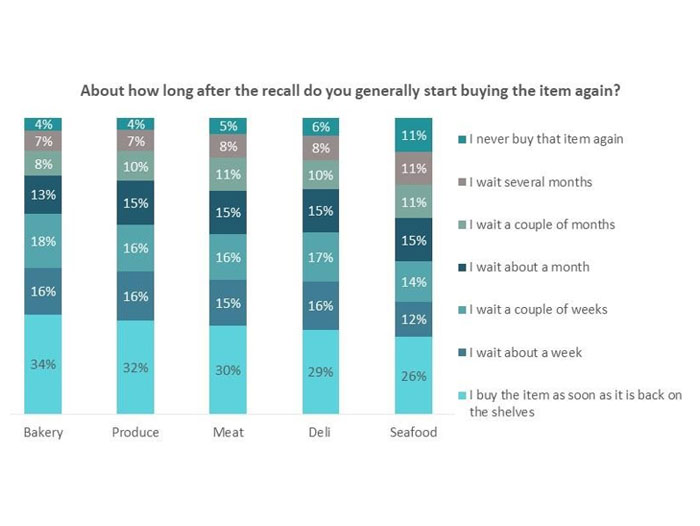Consumers Will Go Back to Buying Their Favorite Items After a Recall
April 25, 2019 | 4 min to read

Idaho Falls, ID – There have been many food recalls over the last several months, and these recalls have affected not only center store, but all fresh departments as well. So, how do consumers feel about these fresh food items once they make their return to grocery store shelves?
A recent study by Category Partners (CP) showed that consumers start buying these products relatively quickly once they are back on the shelves. There are, however, some differences by department, with 49% of respondents saying they will buy a bakery item within a week of the item’s return to the shelves, compared to 45% who will buy a meat item and 38% who will buy a seafood item within a week of its return.
Conversely, there is a small number of shoppers who wait several months to buy previously recalled items again, and even some who will never buy these item again. Four percent of shoppers will never buy a produce item again once there has been a recall, and another 7% will only buy after waiting several months. Consumers are least forgiving when it comes to seafood, with 11% waiting several months to buy again, and that same number permanently deleting the items from their shopping lists.
Beyond differences by department, there are also differences in consumers’ comfort level with buying previously recalled fresh food items by region, age, household income and presence of children, as CP polled 1,000 consumers throughout the US, aged 25-65+ (further demographic information below*).
Shoppers in the South and Northeast tend to buy recalled items again sooner. Cara Ammon, Category Partners’ Director of Research, noted, “While the differences are not quite outside the margin of error, we did notice that across all five fresh fresh departments, slightly more consumers in the South and Northeast said they would be willing to buy previously recalled fresh food items within a week of their return to the shelves, while consumers in the West are slightly slower to buy these items again.”
Younger consumers are more forgiving of recalled items than older consumers. More than half of respondents age 44 and younger said they would buy produce, meat, deli and bakery items within a week or less of the item being back in the stores, while significantly fewer respondents age 65 and older said the same about formerly-recalled produce (37%), meat (33%), deli (33%) and seafood (29%) items.
While these consumers age 44 and younger are more likely to have children in the home, it is interesting to note that consumers with children are likely to buy recalled items sooner than people without children once those fresh items are back on the shelves. More than half (53%) of respondents with children said they would buy a produce item within a week or less of the item being back in stores, compared to 43% of those without children. There is an even bigger gap in the meat and seafood departments, with 54% of parents buying meat and 47% of parents buying seafood in about a week or sooner, compared to 39% and 31% of those without children who buy meat and seafood, respectively, within a week of their return to stores.
Women are generally more cautious than men as they begin to buy previously-recalled items again, especially when it comes to seafood. More than half of women (54%) said they would wait more than a month to buy a previously-recalled seafood item, while 42% of men said the same. And while both are more willing to buy deli items sooner, women again are a little more leery, with 39% waiting a month or longer and 25% of men waiting a month or more.
Across all fresh, consumers with higher incomes and higher levels of education also tend to be somewhat more forgiving when it comes to recalled items. More than half (58%) of consumers earning $150,000+ are likely to buy previously recalled meat items within a week of the items being back on the shelves, compared to 41% of those earning less than $35,000. Similarly, 56% of consumers with a master’s degree or higher are likely to buy produce items within a week of being back on the shelves, compared to 44% of those with a high school diploma or less.
Ammon concluded, “Consumers are generally open to buy fresh foods after a recall, despite there being differences among departments, regions and demographic groups. It is important for the industry – producers and retailers – to rebuild consumers’ trust and do everything possible to provide food that is safe to eat and to communicate when and why it is safe again. Some may take longer than others, but eventually the vast majority of consumers will feel comfortable buying these once-recalled items again.”
*HH income between <$25,000 and >$200,000, HH size between one and 6+ people, encompassing various ethnicities and nearly evenly split between female/male
About Category Partners – a nationally recognized resource, among food companies and retailers, for delivering actionable business/consumer insights, marketing/sales plans and technology/data solutions. Category Partners is grower/shipper owned and headquartered in Idaho Falls, ID, with nationwide offices in Laguna Hills, Calif., Chicago, and Atlanta.
